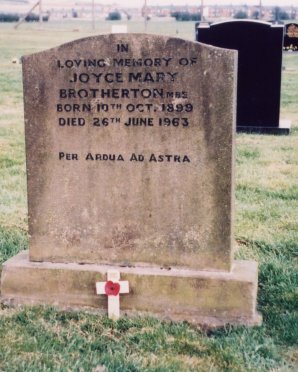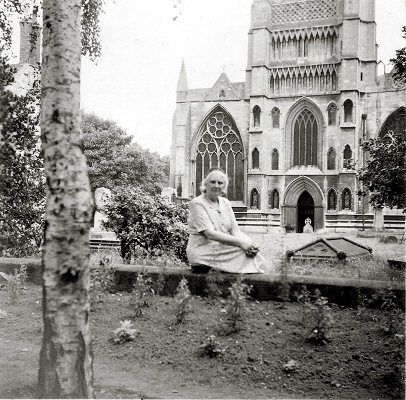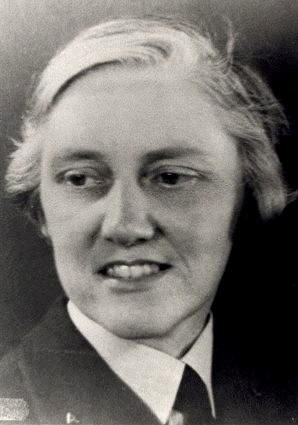207 SQUADRON ROYAL AIR FORCE HISTORY
SECTION OFFICER JOYCE BROTHERTON MBE
'the Silver-Haired WAAF'
Intelligence Officer 207 Squadron
| Joyce Mary Brotherton
was in her mid-forties when on 207 Squadron and was thus old
enough to be the mother of many of the aircrew. In October
1945 Wg Cdr Hugh R Black AFC,
CO of 207 10/44-4/46 wrote this foreword to her unpublished
account* of life on 207 Squadron in the latter years of WWII: "In writing a short foreword to this book, I would like to lay emphasis on the fact that despite their many pranks and escapades, the discipline of the "Crazy Gang" was very good. They were not a clique. On the contrary, they mixed very well with all the other Squadron members which at times has included representatives from Dominion, Colonial and Allied Forces. The author was regarded as a No.207 talisman, and made a
habit of going to the caravan at the end of the runway in
order to wave bon voyage to crews taking off on
operations. But on one miserable rainy evening, S/O
Brotherton did not appear, and on that night the Squadron
lost six aircraft. |
|

| She was Associate Member and Chief Sufferer of
207's Crazy Gang.
Joyce was Schoolmistress in the Lincolnshire village of Fulbeck, near Cranwell. She joined the WAAF: she was Mentioned in Despatches, 8th June 1944, and her Military MBE was awarded in 1949 for her work on the Squadron, on the recommendation of a wartime Station Commander at Spilsby, Wg Cdr WG Cheshire. After the war she worked with the Council of British Societies for Relief Abroad (CBSRA) in Germany. It is not known if she had any contact with those with whom she had served on 207 Squadron or whether she kept in touch with the progress of the Squadron after the war. Don Bell, Doug Rose's Navigator, recalls her visiting the Bells in Thames Ditton when she was at RAF Chessington in the 1950s. Joyce is buried in the very large Bishop Auckland Cemetery. When it was realised that she had terminal cancer she was looked after at Auckland Castle by her cousin, Mrs Agnes Harland, the wife of the then Bishop of Durham, Maurice Harland (1956-66). On her death certificate she is decribed as a School-Teacher (Retired) (Spinster), of Saltburn, Yorkshire. |
If you are not too far away and are ex-207 or have a connection with the Squadron, it would be nice to think that someone might place some flowers on her grave and keep it tidy from time to time, especially on Remembrance Sunday.
If you are a member of Joyce's family or knew her in any way, please contact Frank Haslam, the website editor.
Selected material from Joyce's account will be added from time to time:
“Life on an Operational Station certainly taught you not to mind being laughed at, for you were liable to be ragged about anything and everything. It was rather a desert island sort of existence at times , times when everyone was confined to camp, standing by for uncertain operations & no one could get away. Everyone got cheesed with the everlasting hanging about, interspersed with a few scrubs [cancellations] at unearthly hours. At such times we were thrown upon our own resources & were entirely dependent on each other for companionship. On the whole people stood up to it well, but it was an awful bind.”
“Life on a Bomber Station is made up of moments of feverish activity and breathless excitement, followed by suspense and, all too often, heartbreaks, interspersed with long periods of boredom – but especially boredom.”
And her concluding chapter, which conveys to us who were not there the fellowship of being on 207 and probably many other wartime bomber squadrons:
"These then were the men amongst whom I was privileged to live for more than two and a half years. We worked, played and ate together, we shared the same joys and the same losses and got to know each other so well that we could often read each other’s thoughts. In such close comradeship as this, a man is known for what he really is and for what he has done, not for what he appears to be.
I shall always consider that they paid me the greatest possible compliment by accepting me as one of themselves. Because I was a woman and because I was twenty years older than most of them, they treated me with more consideration than they did each other, but they went out of their way to make me feel that I “belonged” and that they wanted me. When any of my best friends went missing, no kindness or tactful consideration could have exceeded theirs and when I was in trouble it was always to the boys that I turned and they never failed me.
I was rarely conscious of the twenty years between us, for their heavy responsibilities had made them grow up early and brought them a maturer judgement than many older men possess. Consequently, I turned to them for advice just as naturally as they did to me.
Their high spirits and their ability to find fun in anything and everything helped to keep us sane during our bad times and was always a useful asset.
Aircrew are men with initiative, capable and self-reliant and they learn to be unselfish too, especially in the air, but in most cases it becomes a habit.
They are most generous with everything, and by far the greater part of their flying rations used to go to their girl friends, or to small brothers and sisters, or their own children. Because they were always ready to lend anything, they borrowed freely, often without asking and it could be most annoying at times. This was generally due to some emergency, though.
They drank a good deal, of course, there was nothing else to do. They didn’t often get drunk, but most of them tended to drink more than they had done before the War. This was party due to boredom and partly the result of nerve strain, for they were under a bigger strain than most outsiders realised, and they had to let off steam somehow.
I’ve heard it said by a navigator, “This is a pilot’s war”. Personally, I think to a large extent it was. The pilot was almost invariably the captain and if anything went wrong he was generally held responsible. He was accountable for six other lives beside his own, as well as for an aircraft costing £90,000. It was a heavy responsibility, and some of these pilots were only twenty; small wonder if they grew up quickly. Most of them felt it acutely, whatever their age, and would have been thankful to transfer to fighters if they had been allowed to do so, chiefly because of this.
Most of them were friendly types and in this respect the Aussies and Canadians shone. These felt it incumbent upon them to speak to a newcomer and to go out of their way to make him feel at home, whereas an Englishman was more inclined to take the line that it wasn’t his business. At the same time, one and all would go out of their way to help anyone they did know.
Comparatively few of them gave much of the outward observances of religion, their religion was there, but it was of an intensely practical kind for the most part. At the same time, I know two Roman Catholics who, on more than one occasion, having operated all Saturday night, sat up an extra hour or so after their return in order to attend Mass on Sunday morning, before going to bed, although they were likely to be operating again that night and would only get a few hours sleep.
“I don’t think anyone could fly on ops if he hadn’t any religion,” another of the boys said to me once and I am inclined to agree with him. I certainly never knew anyone who struck me as having none.
They spoilt me completely, of course. Having lived and worked with them for so long, I shall find it very difficult to adapt myself to people with other codes and ideals. They were straight and they thought none the worse of you for saying what you thought of them.
Above all and before all, they were intensely loyal to their friends. When one of them went missing, his friend would, as a matter of course, write to his wife or mother, but he would not be content with this. If it was in any way possible, however inconvenient it might be or how painful, he would also trek around Heaven knows where in order to see her and bring her what comfort he could. Nothing was too much trouble.
The two and three quarter years that I spent on an Operational Station brought me more heartbreaks than any other during the whole of my life, but they were by far the happiest of all, because of the many wonderful friendships that I enjoyed and which were more - far more – than worth the pain which was inevitably bound up with them.
Happy the man or woman who can say this !"
from Press on Regardless, JM Brotherton MBE "Dedicated to my many friends in 207 & 44 Squadrons and especially to those who did not return". October 1945, unpublished. The rights of the author and of the Association are to be respected.
For more pictures of Joyce Brotherton, provided by Mrs Joyce Rose, see The Rose Crew page - F/O Doug Rose DFC RCAF was one of the founding members of the 207 Squadron Crazy Gang at RAF Spilsby:
Joyce wrote: "The Gang originally consisted of eight members & one associate member - we all had membership cards on which I typed the objects etc: These were as follows":
"THE CRAZY GANG" MEMBERSHIP CARDOBJECTS1. To annoy as many people as possible as
often as possible in the shortest time possible with a view
to causing them to qualify for membership.
-----
ASSOCIATE MEMBER & CHIEF SUFFERERS/O JM Brotherton [WAAF] |
 |
This photo was taken by Ted
Lawson's sister, Marjorie, at Grantham in 1954, as apparently
that was where Joyce was then living. Joyce had corresponded
with Marjorie. (image: Marjorie E Lawson).
Ted Lawson was the Australian pilot of Lancaster ME473 which collided with a Lancaster of 57 Squadron on 2nd March 1945 during training. All the 207 crew were killed. The church is believed to be the parish church of St Wulfram (see small image).
|
IMPERIAL
WAR MUSEUM
Brotherton, Miss J M MBE
Catalogue number: Documents.6649
"This memoir (270pp) written in 1945 of her service as a WAAF Intelligence Officer at RAF Spilsby, Lincolnshire, during the Second World War, containing excellent descriptions of the organisation of every step of a bombing mission, including her work debriefing the crews, the camaraderie shared with the flight crews of No 207 Squadron Bomber Command (including Australian and Canadian airmen), the tense wait for her friends to return from a mission, the crew's habit of understating the danger faced, the value of radio entertainment for morale, reactions to the announcement of victory in Europe and demobilisation, biographical chapters written by a Canadian bomber pilot describing his flying training in Canada, an Australian pilot in the RAAF, a New Zealand pilot describing recreational activities, and an RAF gunner and an RAF navigator describing the action they have experienced, with the final few chapters relating the experiences of individual airmen in the Squadron and providing good descriptions of bombing missions and the damage and casualties suffered, plus a brief history of No 44 (Rhodesian) Squadron at the base; together with an ms draft (6pp) of her chapter on No 44 Squadron, a Mentioned in Despatches certificate (8 June 1944), a photocopy of the warrant awarding her Membership of the Military Division of the Order of the British Empire (March 1949) plus covering letter, and ms notes (106pp, September 1949 - March 1950) and a ts report (20pp, February 1950) concerning her postwar work for the CBSRA, providing excellent descriptions of the sanitary conditions of various German refugee camps which she visited, the state of the refugees living there, and the clothing and food supplies which were left with them, including transcribed letters of thanks and a list of the camps inspected."
Appeal for research assistance, 29 April 2006
207 Association Members Andrew and Ruth Armstrong are slowly piecing together background information for their intended publication centered on Section Officer Joyce Brotherton, as announced at the 207 Squadron RAF Association 2005 AGM.
They would be absolutely delighted to receive anything relating to
Joyce from those who knew her, with a view to including these
reminiscences, photos, etc. in the completed book. Please contact the editor
who will pass on your message.
207 Squadron Royal Air Force History
updated 29 Apr 2006: 23 Dec 13: images unless otherwise stated from
Raymond Glynne-Owen
some material provided by Andrew and Ruth Armstrong

